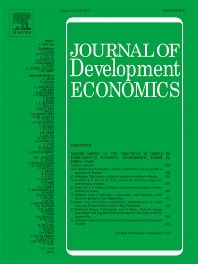
Lagarde, M. and \Riumallo Herl\, C. (2025). Better together? Group incentives and the demand for prevention Journal of Development Economics, 172:.
-
Affiliated author
-
Publication year2025
-
JournalJournal of Development Economics
In a field experiment with 400 groups of informal entrepreneurs in El Salvador, we compare the impact of group incentives (linked to compliance of all members) to equivalent individual ones to encourage cardiovascular check-ups. We test two incentive designs: small rewards and lotteries. Group incentives are as effective as individual ones at increasing demand for prevention, but, unlike individual incentives, they fail to target those with potentially higher health risks. The equal effectiveness of group incentives is linked to more communication, coordination between members and, to some extent, peer pressure. These social dynamics contribute to reduce uncertainty about other group members{\textquoteright} decisions and enhance the perceived net benefit of prevention. Although the preventive check-ups do not induce short-term lifestyle changes, they substantially increase the detection of new risk factors, making all incentives highly cost-effective interventions in this population.